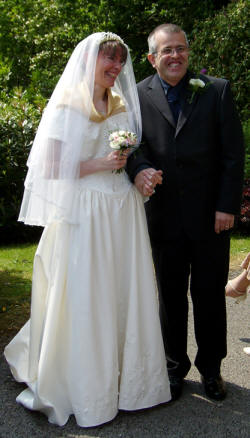Catholic Medical Quarterly Volume 65(4) November 2015
Marriage and Family Life
How to Defend Marriage and Family Life
Steven Smith
 In
Familiaris Consortio, Pope John Paul II observed, “The future of
humanity passes by way of the family.” A generation on, his successor,
Pope Benedict XVI, in his Christmas greetings address to the Roman Curia
on December 20th 2010, observed, “The very future of humanity is at
stake”. In July 2013 , as if to fulfil in their own country this
apocalyptic assessment of the state of the world, the British Government
legalised so-called same-sex “marriage” (hereafter abbreviated SSM).
Despite intense and sustained opposition to the proposals to reject the
timeless definition of marriage as the voluntary life-long union of one
man and one woman, the Coalition Government forced through the legislation
which had been opposed by half of David Cameron’s MPs at Third Reading and
by a petition that was taken up throughout the country and signed by
two-thirds of a million people.
In
Familiaris Consortio, Pope John Paul II observed, “The future of
humanity passes by way of the family.” A generation on, his successor,
Pope Benedict XVI, in his Christmas greetings address to the Roman Curia
on December 20th 2010, observed, “The very future of humanity is at
stake”. In July 2013 , as if to fulfil in their own country this
apocalyptic assessment of the state of the world, the British Government
legalised so-called same-sex “marriage” (hereafter abbreviated SSM).
Despite intense and sustained opposition to the proposals to reject the
timeless definition of marriage as the voluntary life-long union of one
man and one woman, the Coalition Government forced through the legislation
which had been opposed by half of David Cameron’s MPs at Third Reading and
by a petition that was taken up throughout the country and signed by
two-thirds of a million people.
The outspoken opposition to the Act in the corridors of power was not publicly matched by the Prime Minister’s Catholic subjects including those in positions of authority within the Church. Notwithstanding a last-ditch postcard campaign to MPs prior to the Bill’s Second Reading in the preceding February, the Catholic Church throughout the United Kingdom was mute in comparison to the Evangelical-led Christian Institute who not only organised the aforesaid petition but also spearheaded the leafleting campaigns throughout marginal constituencies that equipped recipients with the information they needed to lobby their MPs in an attempt to persuade them to oppose the proposals.
Why was Catholic opposition to the Act so muted and what does this tell us about what it means to be pro-life?
A revealing answer to this question is supplied by a survey taken by the world’s solely Internet-based Catholic television station – ChurchMilitant.tv – at the January 2014 March for Life in Washington DC. Of the young people interviewed, one-third said that they saw nothing wrong with contraception and 20% ie one-fifth saw nothing wrong with two persons of the same sex having a romantic relationship if “romantic” is interpreted as meaning “physical”
Although this event took place 6 months after the Marriage (Same-Sex Couples) Act became law in the UK, its significance lies in the alarmingly large number of dissenting responses to the questions from a constituency of people of whom 90% identified themselves as Catholic and among whom acceptance of Catholic teaching might be assumed to be overwhelming.
Before the Act became legal in this country, a pro-life group local to me saw its members disagree over the decision of a major national pro-life organisation to take a stand against the “redefinition” of marriage that had just been proposed by the British Government. The main opponent of the organisation’s stance against SSM, held that “redefining” marriage had nothing to do with being pro-life and feared that opposing the Bill would only alienate those she knew who might otherwise become actively pro-life.
What does it mean to be pro-life?
All of this raises the question of what it does mean to be pro-life. Clearly the respondents to the ChurchMilitant.tv survey equated pro-life with being “anti-abortion” or, as ChurchMilitant.tv spokesman Michael Voris flatly put it, “pro-birth”. This is the definition of pro-life which prevailed when I first encountered the abortion issue in my early teens when the Corrie Bill (1) was introduced during the first Thatcher Parliament. It is also the definition of pro-life which is generally accepted whenever the phrase appears in the publishing and broadcast media, irrespective of whether the person using it supports the prolife (anti-abortion) stance or not. If the mainstream pro-life movements in Britain and the USA are any guide, this definition remains the yardstick by which the voting intentions of Parliamentary candidates are measured at election time when inviting their supporters to consider which candidate to vote for.
Is this definition adequate when faced with the urgent need to defend the family in the post-modern age especially now that marriage itself has been redefined? In an age when even people who identify themselves as “pro-life” understand what an abortion is yet disagree on what marriage is, shouldn’t our definition of what it means to be pro-life necessarily become more wide-ranging? When we defend marriage and the integrity of the act of married love in its timeless essence, are we not simultaneously proposing that such openness, grounded in the lifelong commitment that real marriage entails, must constitute the basis of a real and radically new pro-life identity and also be the cornerstone of a recovery of the same civilisation that Pope Francis’ two immediate predecessors insisted is on the verge of collapse?
The problem with Civil rights based arguments
 The
adoption of the “civil rights” approach to the abortion issue used by the
pro-life movement on both sides of the Atlantic Ocean led to the pro-life
stance being less identified with upholding the natural law as classically
upheld by the Catholic Church and more with placing the right to life on
the same level as a whole plethora of claimed “rights” to whose spectrum
has been added, in recent years, the “gay rights” movement. In terms of
historical perspective, this not surprising. The civil rights movement
was at the height of its influence in the USA when the Abortion Act became
law in Britain in 1967; therefore the arguments in defence of unborn
children against abortion were framed in terms of the right to life in
this same civil rights context. Unfortunately, so too were the “rights”
of women with unplanned pregnancies to have abortions and it was this
“right” which was to win the day.
The
adoption of the “civil rights” approach to the abortion issue used by the
pro-life movement on both sides of the Atlantic Ocean led to the pro-life
stance being less identified with upholding the natural law as classically
upheld by the Catholic Church and more with placing the right to life on
the same level as a whole plethora of claimed “rights” to whose spectrum
has been added, in recent years, the “gay rights” movement. In terms of
historical perspective, this not surprising. The civil rights movement
was at the height of its influence in the USA when the Abortion Act became
law in Britain in 1967; therefore the arguments in defence of unborn
children against abortion were framed in terms of the right to life in
this same civil rights context. Unfortunately, so too were the “rights”
of women with unplanned pregnancies to have abortions and it was this
“right” which was to win the day.
In 2013, history repeated itself when the political battle for real marriage was lost in the same way. During the campaign to defend real marriage, those opposing redefinition did so from a civil rights perspective e.g. refining marriage is unnecessary because same-sex couples have all the “rights” of marriage via civil partnerships so “redefinition” is unnecessary. Some pro-life campaigners who opposed redefinition asserted that marriage is the best way of protecting unborn children on the basis that those conceived by a father and a mother married to each other are less likely to be aborted.
Although statistics corroborate this latter assertion, viewing the issues in this way doesn’t confront the hard truth of the inextricable link between abortion and contraception of which even the predominantly Catholic marchers in Washington questioned in January 2014 appeared unaware but of which the anti-life lobby who confront us are all too conscious. Dr Judith Bury, a former medical advisor to the Brook Advisory Service asserted in 1981, “There is overwhelming evidence that, contrary to what you might expect, the provision of contraception leads to an increase in the abortion rate” (2).
Be that as it may, contraception has become the great unmentionable among Catholics today and not just from the pulpit. Over the years, I have even become accustomed to hearing pro-lifers say, whenever contraception has been mentioned as an issue, for example at a pro-life conference, that “this is not a Catholic organisation”. Yet the time has surely come to admit that it has been the reluctance of pro-lifers to publicly oppose contraception on the grounds that it is seen as a “Catholic” issue that has been our undoing in the unsuccessful attempt to defeat abortion and so-called same-sex “marriage”. During the latter campaign in 2011-2013, when presented with arguments against SSM which asserted that marriage between one man and one woman is the best way to protect unborn children, I couldn’t help thinking that we were all dodging the real issue regarding the unitive as well as procreative aspects of human sexuality which both contraception and homosexual practice thwart by their very nature (sic).
Because we didn’t define pro-life as encapsulating opposition to contraception as well as opposing abortion and euthanasia/assisted suicide, Catholics were hardly in a position to oppose so-called same-sex “marriage” on the grounds that it is intrinsically sterile. Furthermore because opposition to contraception is equated with the profession of the Catholic religion and not because it is opposed to the natural law, such opposition was similarly excluded from our side of the debate because it would have been interpreted as Catholic and also as sectarian and out of kilter with the civil rights outlook to which the pro-life movement has looked when framing its arguments in the political arena.
For doctors, nurses and healthcare workers
The failure to defend the pro-life position and also to defend the position on SSM, is bound to make things very hard for clinicians practising in the NHS. We have already seen the problems faced by midwives, recognise that qualifications in family planning require active co-operation in fitting abortifacient devices etc. but if these things cannot be mentioned from the pulpit, or within pro-life organisations, even less so can the church defend its loyal members who wish to practice according to their conscience and morals. Today’s NHS is undoubtedly the sharpest end of what is often called the public square. There, employees need the Church and need her defence of their duty to act morally and ethically.
Conclusion
So how do we as Catholics defend marriage and family life? By an unswerving commitment to real marriage in public as well as in private life from Catholic laity and by an uncompromising fidelity to Catholic teaching on contraception by both bishops and priests in their pastoral letters and from their pulpits. Above all, we must incorporate public opposition to contraception as the basis of an authentic pro-life stance that is the cornerstone of our presentation of the Gospel of Life. As the sun sets on what is left of our rapidly disintegrating civilisation, it is the only option we have left if we mean what we say when we profess to be Catholic, especially in the public square.
FOOTNOTES
- John Corrie, former Tory MP for Bute and North Ayrshire, introduced a Bill in 1979 that would have reduced the upper limit for abortions to 20 weeks. The Bill was eventually defeated.
- “Sex Education for Bureaucrats” by Dr Judith Bury (The Scotsman, June 29th 1981)
